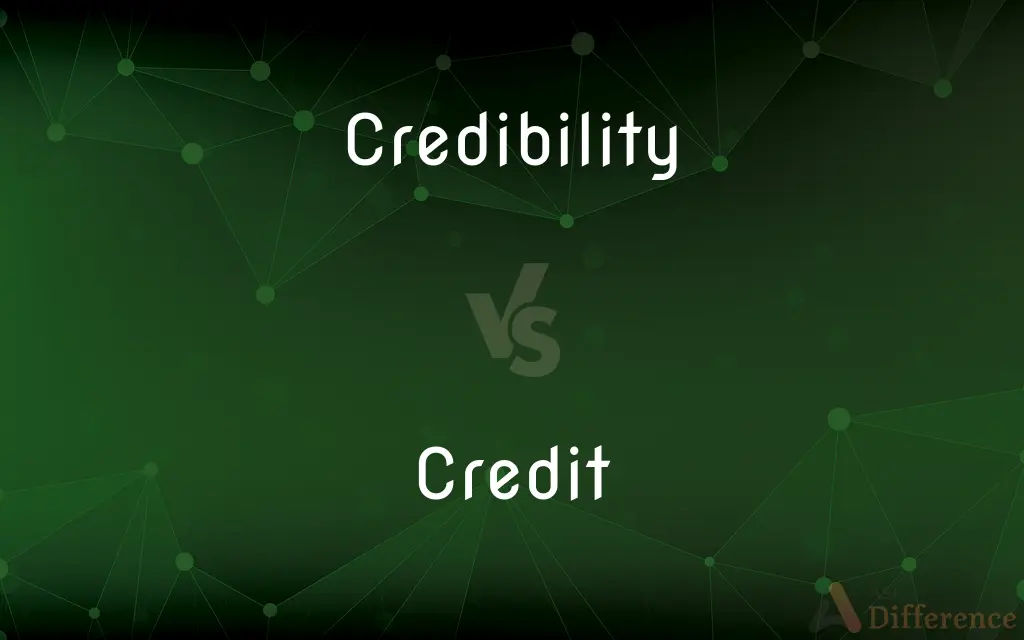Credibility vs. Credit — What's the Difference?
By Urooj Arif & Maham Liaqat — Updated on April 4, 2024
Credibility involves trust and reliability in the context of information or individuals, while credit pertains to financial trustworthiness or acknowledgment for contributions.

Difference Between Credibility and Credit
Table of Contents
ADVERTISEMENT
Key Differences
Credibility is fundamentally about the trustworthiness and reliability of a source or person, particularly in conveying information or facts. It's built over time through consistent honesty and integrity. Credit, on the other hand, refers to the trust given to individuals or entities based on their financial history, enabling them to borrow money or access goods/services before payment. It's also used to acknowledge someone's role in creating something.
While credibility is essential in fields like journalism, research, and leadership, where the focus is on the authenticity and reliability of information and character, credit is pivotal in finance and economics, underpining lending, borrowing, and fiscal responsibility. Credit scores, for instance, are quantifiable measures of one's creditworthiness, whereas credibility is more subjective and nuanced, assessed through past actions and reputations.
Credibility can be applied more broadly beyond financial contexts, encompassing ethical behavior, expertise, and professional conduct. It's subjective and varies with perception, influenced by past actions, expertise, and ethical conduct. Credit also acknowledges contributions or authorship in creative and intellectual works, highlighting respect for intellectual property and contribution.
Maintaining credibility requires consistent truthfulness, expertise, and reliability, enhancing one's reputation and influence. Credit maintenance, however, involves financial discipline, timely payments, and prudent fiscal management, directly impacting financial opportunities and responsibilities.
Comparison Chart
Definition
Trustworthiness in character and information
Financial trustworthiness; acknowledgment for contributions
ADVERTISEMENT
Key Contexts
Journalism, research, leadership
Finance, economics, intellectual property
Measurement
Subjective, based on reputation and actions
Quantifiable (credit score); acknowledgment of contribution
Importance
Essential for trust and authority in various fields
Crucial for financial transactions and acknowledgment in creative works
Maintenance
Through consistent honesty, expertise, and ethical behavior
Financial discipline, timely payments, managing debts
Compare with Definitions
Credibility
Earned respect for maintaining truthfulness and integrity.
The teacher's credibility with students grew as she consistently treated everyone fairly.
Credit
A notation of honor given for some action or quality.
Students earn credits for courses passed.
Credibility
The perceived validity of a statement or source.
Fact-checking enhances the credibility of news stories.
Credit
The ability of a customer to obtain goods or services before payment.
He bought the car on credit.
Credibility
The quality of being trusted and believed in.
The scientist's credibility is often reflected in their publication record.
Credit
Recognition or acknowledgment for something.
The author received credit for her groundbreaking research.
Credibility
Reliability in performing actions or providing information.
A journalist's credibility hinges on their ability to report facts accurately.
Credit
Trust placed in someone's financial reliability.
Maintaining good credit requires timely payment of bills.
Credibility
Dependability in terms of professional conduct.
A lawyer’s credibility is crucial for their career success.
Credit
The amount of money available to borrow.
His credit limit on the card was increased.
Credibility
Credibility comprises the objective and subjective components of the believability of a source or message. Credibility dates back to Aristotle theory of Rhetoric.
Credit
Credit (from Latin credit, "(he/she/it) believes") is the trust which allows one party to provide money or resources to another party wherein the second party does not reimburse the first party immediately (thereby generating a debt), but promises either to repay or return those resources (or other materials of equal value) at a later date. In other words, credit is a method of making reciprocity formal, legally enforceable, and extensible to a large group of unrelated people.
Credibility
The quality of being trusted and believed in
The government's loss of credibility
Credit
An arrangement for deferred payment of a loan or purchase
A store that offers credit.
Bought my stereo on credit.
Credibility
The quality, capability, or power to elicit belief
"The scandals posed a crisis of credibility for collegiate athletics" (Taylor Branch).
Credit
The terms governing such an arrangement
Low prices and easy credit.
Credibility
A capacity for belief
A story that strained our credibility.
Credit
The time allowed for deferred payment
An automatic 30-day credit on all orders.
Credibility
Reputation impacting one's ability to be believed.
After weeks of blowing smoke, her credibility with me was next to nil.
Credit
The deduction of a payment made by a debtor from an amount due.
Credibility
(legal) Believability of statements by a witness, as measured by whether the testimony is probable or improbable when judged by common experience.
Credit
The positive balance or amount remaining in a person's account.
Credibility
The quality of being credible; credibleness; as, the credibility of facts; the credibility of witnesses.
Credit
A credit line.
Credibility
The quality of being believable or trustworthy
Credit
Reputation for solvency and integrity entitling a person to be trusted in buying or borrowing
You should have no trouble getting the loan if your credit is good.
Credit
Official certification or recognition that a student has successfully completed a course of study
He received full credit for his studies at a previous school.
Credit
A unit of study so certified
This course carries three credits.
Credit
Often credits An acknowledgment of work done, as in the production of a motion picture or publication
At the end of the film we stayed to watch the credits.
Credit
Influence based on the good opinion or confidence of others
Used his credit with the police to get them to devote more time to the case.
Credit
Recognition or approval for an act, ability, or quality
Gave them credit for a job well done.
Credit
A source of honor or distinction
This exceptional athlete is a credit to our team.
Credit
A reputation for sound character or quality; standing
It is to their credit that they worked so hard without complaining.
Credit
Belief or confidence in the truth of something
"They give no credit to [his] scurrilous assertions" (John Edgar Wideman).
Credit
To give as a credit
Credited $500 to her account.
Credit
To give a credit to
Credit an account.
Credit
To give or award an educational credit to.
Credit
To regard as having performed an action or being endowed with a quality
Had to credit them with good intentions.
Credit
To ascribe or attribute
Credit the invention to him.
Credited her recovery to an innovative treatment.
Credit
(Archaic) To bring honor or distinction to.
Credit
(transitive) To believe; to put credence in. British usage?
Someone said there were over 100,000 people there, but I can't credit that.
Credit
To add to an account.
Credit accounts receivable with the amount of the invoice.
For the payroll period credit employees' tips to their wages paid account and debit their minimum wage payable account.
The full amount of the purchase has been credited to your account.
Credit
(transitive) To acknowledge the contribution of.
I credit the town council with restoring the shopping district.
Credit the point guard with another assist.
Credit
(transitive) To bring honour or repute upon; to do credit to; to raise the estimation of.
Credit
Reliance on the truth of something said or done; faith; trust.
Credit
(uncountable) Recognition, respect and admiration.
I give you credit for owning up to your mistake.
He arrived five minutes late, but to his credit he did work an extra ten minutes at the end of his shift.
Credit
(countable) Acknowledgement of a contribution, especially in the performing arts.
She received a singing credit in last year's operetta.
Credit
Written titles and other information about the TV program or movie shown at the beginning and/or end of the TV program or movie.
They kissed, and then the credits rolled.
Credit
A privilege of delayed payment extended to a buyer or borrower on the seller's or lender's belief that what is given will be repaid.
In view of your payment record, we are happy to extend further credit to you.
Credit
The time given for payment for something sold on trust.
A long credit or a short credit
Credit
A person's credit rating or creditworthiness, as represented by their history of borrowing and repayment (or non payment).
What do you mean my credit is no good?
Credit
(accounting) An addition to certain accounts; the side of an account on which payments received are entered.
Credit
(tax accounting) A reduction in taxes owed, or a refund for excess taxes paid.
Didn't you know that the IRS will refund any excess payroll taxes that you paid if you use the 45(B) general business credit?
Credit
A source of value, distinction or honour.
That engineer is a credit to the team.
Credit
(science fiction) A unit of currency used in a fictional universe or timeframe.
To repair your star cruiser will cost 100,000 credits.
Credit
A nominal unit of value assigned outside of a currency system.
Would you like to play? I put in a dollar and I've got two credits left.
Credit
(uncountable) Recognition for having taken a course (class).
If you do not come to class, you will not get credit for the class, regardless of how well you do on the final.
Credit
(countable) A course credit, a credit hour – used as measure if enough courses have been taken for graduation.
Dude, I just need 3 more credits to graduate – I can take socio-linguistics of Swahili if I want.
Credit
Reliance on the truth of something said or done; belief; faith; trust; confidence.
When Jonathan and the people heard these words they gave no credit unto them, nor received them.
Credit
Reputation derived from the confidence of others; esteem; honor; good name; estimation.
John Gilpin was a citizenOf credit and renown.
Credit
A ground of, or title to, belief or confidence; authority derived from character or reputation.
The things which we properly believe, be only such as are received on the credit of divine testimony.
Credit
That which tends to procure, or add to, reputation or esteem; an honor.
I published, because I was told I might please such as it was a credit to please.
Credit
Influence derived from the good opinion, confidence, or favor of others; interest.
Having credit enough with his master to provide for his own interest.
Credit
Trust given or received; expectation of future playment for property transferred, or of fulfillment or promises given; mercantile reputation entitling one to be trusted; - applied to individuals, corporations, communities, or nations; as, to buy goods on credit.
Credit is nothing but the expectation of money, within some limited time.
Credit
The time given for payment for lands or goods sold on trust; as, a long credit or a short credit.
Credit
To confide in the truth of; to give credence to; to put trust in; to believe.
How shall they creditA poor unlearned virgin?
Credit
To bring honor or repute upon; to do credit to; to raise the estimation of.
You credit the church as much by your government as you did the school formerly by your wit.
Credit
To enter upon the credit side of an account; to give credit for; as, to credit the amount paid; to set to the credit of; as, to credit a man with the interest paid on a bond.
Crove, Helmholtz, and Meyer, are more than any others to be credited with the clear enunciation of this doctrine.
Credit
Approval;
Give her recognition for trying
He was given credit for his work
Give her credit for trying
The credits were given at the end of the film
Credit
Money available for a client to borrow
Credit
An accounting entry acknowledging income or capital items
Credit
Used in the phrase `to your credit' in order to indicate an achievement deserving praise;
She already had several performances to her credit
Credit
Arrangement for deferred payment for goods and services
Credit
Recognition by a college or university that a course of studies has been successfully completed; typically measured in semester hours
Credit
A short note recognizing a source of information or of a quoted passage;
The student's essay failed to list several important citations
The acknowledgments are usually printed at the front of a book
The article includes mention of similar clinical cases
Credit
An entry on a list of persons who contributed to a film or written work
Credit
Give someone credit for something;
We credited her for saving our jobs
Credit
Give credit for;
She was not properly credited in the program
Credit
Accounting: enter as credit;
We credit your account with $100
Credit
Have trust in; trust in the truth or veracity of
Common Curiosities
Can credibility affect one's credit?
Indirectly, yes. Personal credibility can influence professional opportunities and financial decisions, potentially affecting credit.
What defines someone's credibility?
Credibility is defined by their trustworthiness, reliability, and integrity in actions and information dissemination.
Can credit be negative?
Yes, if one fails to manage their financial obligations responsibly, leading to a poor credit score.
How do you build credibility?
Through consistent honesty, expertise, reliability, and ethical behavior in all actions and communications.
Why is credibility important?
It's essential for establishing trust, authority, and respect in professional and personal relationships.
How can credit be improved?
By making payments on time, reducing debt levels, and managing credit accounts wisely.
How does credit affect purchasing power?
Good credit increases purchasing power by enabling access to loans and credit at favorable terms.
How is credit different from credibility?
Credit refers to financial trustworthiness and acknowledgment of contributions, whereas credibility relates to the reliability of character and information.
Does credit only apply to finances?
Primarily, but it also pertains to acknowledgment in intellectual contributions and creative works.
Can credibility be lost?
Yes, through dishonesty, unethical behavior, or inconsistent actions.
What impacts a credit score?
Payment history, debt levels, credit history length, types of credit used, and new credit accounts.
What role does credibility play in leadership?
It's crucial for gaining and maintaining the trust and respect of team members and stakeholders.
Is credibility quantifiable like credit?
No, credibility is more subjective and assessed through perceptions and past actions, unlike credit, which can be quantified through scores.
Is credibility more important than credit?
The importance varies by context; both are vital in their respective domains.
Can someone have good credit but low credibility?
Yes, it's possible if they manage finances well but lack integrity or reliability in other areas.
Share Your Discovery

Previous Comparison
Ember vs. Umber
Next Comparison
Mysticism vs. SpiritualityAuthor Spotlight
Written by
Urooj ArifUrooj is a skilled content writer at Ask Difference, known for her exceptional ability to simplify complex topics into engaging and informative content. With a passion for research and a flair for clear, concise writing, she consistently delivers articles that resonate with our diverse audience.
Co-written by
Maham Liaqat













































